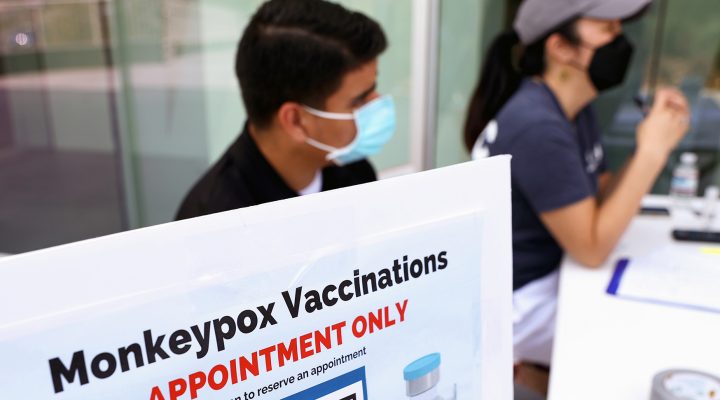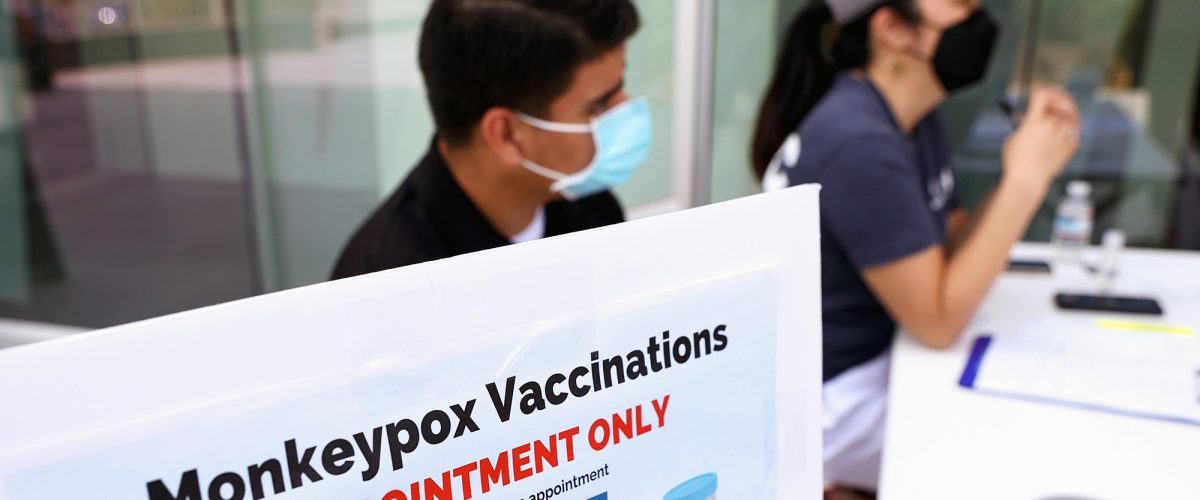This story has been updated to include comments from Leland Allen, an infectious disease doctor in Birmingham, Ala.
In one social media meme, a happy young woman and man are shown walking down a wedding aisle with friends applauding them. The headline reads: “How to avoid getting monkeypox.”
On Twitter, U.S. Rep. Marjorie Taylor Greene posted a video by CDC Director Rochelle Walensky addressing monkeypox and wrote: “If monkeypox is a sexually transmitted disease, why are kids getting it?”
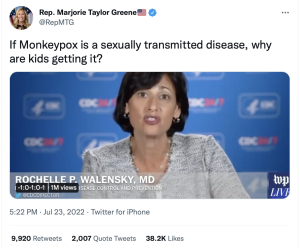 The first-term Georgia congresswoman is no stranger to outlandish and provocative statements. And the implication of her tweet was to reinforce a trope of conservative evangelical Republicans that gay men are pedophiles who are “grooming” young children as their victims.
The first-term Georgia congresswoman is no stranger to outlandish and provocative statements. And the implication of her tweet was to reinforce a trope of conservative evangelical Republicans that gay men are pedophiles who are “grooming” young children as their victims.
Although substantial research exists to debunk Greene’s insinuation that gay men are pedophiles — most pedophiles are not gay, and few gay men have been found to abuse children at all — hers is a message carried with force in the ongoing culture wars over families, marriage and schools.
Likewise, the meme suggesting heterosexual marriage is the way to prevent the spread of monkeypox assumes it is a sexually transmitted disease to which only members of the LGBTQ community are susceptible.
‘Research, not hysteria’
To Nicky Bell, that sounds a lot like the early days of the HIV/AIDS epidemic, when condemnation stood in the way of disease prevention and cure. What heterosexual people assumed to be only a disease affecting gay men then began to spread to women and children and heterosexual men.
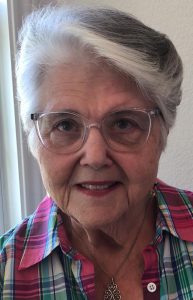
Nicky Bell
“As a retired nurse practitioner, I had the privilege of volunteering at the AIDS Resource Center of Dallas for four years,” said Bell, a layperson at Wilshire Baptist Church in Dallas. “Looking back at the AIDS crisis and now as we contend with the new global virus of monkeypox, I can’t help but see some comparisons.”
For example, both viruses “originated in monkeys in Africa, have been slow to receive governmental recognition and resources and are chaotic in nature. Gay men are at high risk for infection. They may well be blamed for the spread of the infection as was the case with AIDS.”
That kind of blame is both misplaced and deadly, Bell said. “Especially during the early years of AIDS, public understanding of facts concerning the virus often were incorrect or at best misleading. There was a lack of knowledge as well as personal, preconceived perceptions about race, gender and sexuality. Ostracization and isolation resulted.”
She has a warning for today: “Are we going to repeat the mistakes made with the response to AIDS in our response to monkeypox? Hopefully we will learn from our history. Let’s go with a slogan from a 1983 poster which said of AIDS: ‘We Need Research Not Hysteria.”
Tell the truth
Rich Havard, an ordained Baptist minister living in Chicago, agrees. Talking about monkeypox as a “gay disease” or associating it with pedophilia is just wrong, he said.
“Words matter. Whether a poorly worded headline or vicious political rhetoric, we must hold all public speech to a higher standard. It is possible to be candid about the fact that monkeypox is mostly affecting men who have sex with men while also being loud about the truth that this disease has nothing to do with being gay.

Rich Havard
“At a time when anti-queer beliefs are gaining ground through everything from book bans to draconian laws, we need news sources to be precise, politicians to use their words wisely, and prophets to call both groups to higher path when they fail.”
And the church has a role to play there, he added.
“The church has a sacred duty to tend to the body and the soul, especially the bodies and souls of LGBTQ people whom the church has consistently maligned. For the body, the church must get practical: educate people about monkeypox, help people get vaccinated, and care for people who contract the disease. For the soul, the church must push against shame with loving care and use its voice to offer faithful correctives to the villainization of LGBTQ people,” he advised.
Faith leaders, speak up
Also, queer faith leaders like him can have important roles to play, Havard said. “I have chosen to be very open about getting the vaccine myself, and I also have worked to spread the word to others about vaccination opportunities. My hope is that these small actions help other people feel permission to get vaccinated, too, without the weight of stigma.”
While queer people are “fearful and frustrated,” they are also creative, he added. “We are the descendants of a community that has been paving pathways where blockades existed for generations.”
Today, those blockades too often come from government and public health officials, who move at a “glacial pace to respond in any meaningful way.” Faced with little help, “queer people are doing what we have always done — create our own paths forward. For instance, most people I know who are vaccinated found out about vaccination opportunities from an open-source Google doc created by a queer person who wanted to support their community when government support was minimal. The government has had to play catch up to the ways the queer community already was mutually caring for one another. But this is nothing new.”
“Queer people are doing what we have always done — create our own paths forward.”
There’s also a racial and socioeconomic angle to the way monkeypox already is being addressed, he warned. “The dismal public health response to monkeypox has prioritized white gay men who have more money and access than other queer people, especially BIPOC queer and trans communities. We must push the government not only to respond more effectively, but also more equitably.”
Not a ‘gay’ disease
“This is most certainly not a ‘gay’ disease. It’s not even a true sexually transmitted infection, but it does require direct contact with a contagious person, or perhaps less commonly, contact with a contaminated surface or object,” said Leland Allen, an infectious disease specialist in Birmingham, Ala. He is a graduate of Baylor University and the University of Alabama at Birmingham Medical School. He also is a member and teacher at Mountain Brook Baptist Church in Birmingham.
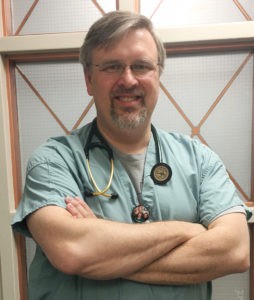
Leland Allen
“Sex is probably the most direct physical contact two people will have outside of combat sports, but monkeypox is certainly transmissible with only casual contact. In the past, outbreaks have been associated with handling contaminated animals, most recently Gambian Giant Rats and prairie dogs in the exotic pet trade.
“As one of my colleagues has said, ‘This is not a gay disease. It’s not a sexually transmitted disease. It is an infectious disease!”
What is monkeypox?
The educational nonprofit Vaccinate Your Family offers this simple definition of monkeypox: “Monkeypox is a rare disease caused by infection with the monkeypox virus. It is related to the viruses that cause smallpox and cowpox, but not related to chickenpox. Despite the name ‘monkeypox,’ the source of the disease is unknown. The first human case of monkeypox was recorded in 1970, and monkeypox has been reported in relatively low numbers on an ongoing basis since then in some countries. Monkeypox is milder than smallpox and is rarely fatal.”
Currently, the virus “is mostly impacting people who have reported having close, sustained physical contact with other people who have monkeypox. While many of those affected in this outbreak are men who have sex with men, anyone who has been in close contact with someone who has monkeypox can get the illness.”
While the White House on Aug. 4 declared monkeypox to be a public health emergency, it remains more difficult to contract than COVID-19, according to the CDC.
“Monkeypox does not spread easily between people; however, anyone in close contact with a person with monkeypox can get it and should take steps to protect themselves,” the CDC website advises. “People who do not have monkeypox symptoms cannot spread the virus to others.”
“People who do not have monkeypox symptoms cannot spread the virus to others.”
This appears to be a key difference between monkeypox and COVID-19. With COVID, individuals often are highly contagious before they show any visible symptoms of the disease, allowing it to spread unnoticed. With monkeypox, transmission occurs through visible skin lesions or from people who have a fever or other physical symptoms.
The current situation
In reporting on the White House declaration of a public health emergency, CNN explained: “Since the first U.S. monkeypox case was identified in mid-May, more than 6,600 probable or confirmed cases have been detected in the United States. Cases have been identified in every state except Montana and Wyoming.”
US Food and Drug Administration Commissioner Robert Califf told reporters Aug. 4 that the nation is at a “critical inflection point,” causing the FDA to consider ways to get more vaccines to more people more rapidly. Currently, available vaccines have been prioritized for individuals deemed to be most at risk.
“The goal has always been to vaccinate as many people as possible,” Califf said.
There is one interesting wrinkle to the monkeypox vaccination question, however. According to the CDC, people who previously have received vaccinations against smallpox should carry some level of protection against monkeypox. How much or how long the protection lasts is not yet understood.
In the U.S., routine vaccination against smallpox stopped in 1972, after the disease was declared to be eradicated.

